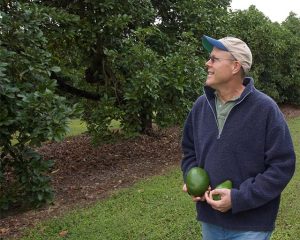What conditions are ideal for farmers to successfully grow tropical fruit in different regions of Florida?

Scientists at the University of Florida Institute of Food and Agricultural Sciences (UF/IFAS) say this question is at the root of concern for them as they communicate with new and potential growers who are not aware of a bigger problem at stake.
Way too often, growers are unaware of key conditions necessary to producing a successful tropical fruit crop, once you cross north of the South Florida landscape and face freezing weather patterns, said Jonathan Crane, a UF/IFAS professor of horticultural sciences and Extension tropical fruit specialist stationed at UF/IFAS Tropical Research and Education Center (TREC) in Homestead.
Crane, along with UF/IFAS faculty in collaboration with the UF/IFAS Miami-Dade County Extension office, are hosting a free workshop titled, “Climate Risk and Opportunities for Tropical and Subtropical Crops Production in Florida” on May 9.
The workshop, offered in-person and on Zoom, aims to provide agricultural producers with the essentials to navigate challenges and capitalize on opportunities to promote sustainable tropical fruit crop production in different regions.

“There is a reason why you do not see tropical fruit in the north like Lake Okeechobee. Certain trees need more drainage, while others need a particular type of soil and more importantly, avoid extended freezing temperatures,” said Crane. “We want to help new interested growers and those growers looking to expand to the north make beneficial decisions about what to grow, what to do, what to look for and the climate conditions they need to be aware for growing certain varieties of tropical fruit.”
A key component of the workshop features a UF web-based platform designed to assist growers in mitigating risks associated with climate fluctuations. Designed by Clyde Fraisse, a UF/IFAS professor of agricultural and biological engineering, the workshop will demonstrate how growers can take advantage of the tool.
Event Details:
Date: Thursday, May 9, 2024
Time: 9:30 a.m. to 2:30 p.m.
Workshop formats:
If attending in-person: Miami-Dade County Extension Service, 18710 SW 288 St., Homestead, FL 33033
If attending by Zoom, advance registration is required to receive access to the virtual session. Please register with this link.
Here are highlights of the program:
9:30 a.m. Welcome and introductions, overview of the mission and activities at the Southeast Climate Hub. Speakers: Jonathan Crane and Clyde Fraisse
9:45 a.m. Is our climate changing? Florida’s historical and future weather patterns with Speakers: Crane and Young Gu Her)
- Observed historical weather patterns.
- Projected future weather patterns.
- How does our groundwater react to the changes?
- What do the changes mean to tropical fruit trees?
- Followed by Question-and-Answer Session (10 minutes)
10:15 a.m. What are climate requirements for tropical fruit production. Speakers: Jeff Wasielewski, Crane
- General aspects about climate in south Florida, perspectives for avocado, banana, carambola, dragon fruit, mango, etc.
- Climate requirements for different crops: optimum growing temperature range, temperature ranges for freeze damage, heat damage temperature ranges, wind, and flood tolerance.
- Potential implications of climate trends for tropical fruit production
- Followed by Question-and-Answer Session (10 minutes)
11:00 a.m. What do we expect for 2024? (Steve McNulty, Fraisse, Crane, )
- Review of the hurricane forecast for the 2024 season and hurricane preparedness materials available at the SE Climate Hub
- How to prepare and recover from hurricanes: A guide for tropical fruit growers in Florida (Crane)
- How about El Niño? What is the expected ENSO phase for this year? How does it affect our climate?
- Followed by Question-and-Answer Session (10 minutes)
Noon: Lunch
1:00 p.m. How to mitigate risk and prepare ourselves for the future climate (Haimanote Bayabil, Crane, Wasielewski)
- Mitigation practices to avoid flooding and/or continuously wet soil conditions (e.g., beds, drainage ditches and/or tiles, site selection, tolerant plants, etc.)
- Management practices to mitigate the effects of extreme weather events (drought, heat waves, etc.)
1:30 p.m. Introduction to AgroClimate (Fraisse)
1:50 p.m. Open discussion with participants about challenges and opportunities for tropical fruit production in Florida
2:20 PM Final comments and adjournment.
##
By Lourdes Mederos, rodriguezl@ufl.edu
ABOUT UF/IFAS
The mission of the University of Florida Institute of Food and Agricultural Sciences (UF/IFAS) is to develop knowledge relevant to agricultural, human and natural resources and to make that knowledge available to sustain and enhance the quality of human life. With more than a dozen research facilities, 67 county Extension offices, and award-winning students and faculty in the UF College of Agricultural and Life Sciences, UF/IFAS brings science-based solutions to the state’s agricultural and natural resources industries, and all Florida residents.
WHY FOOD IS OUR MIDDLE NAME
Feeding a hungry world takes effort. Nearly everything we do comes back to food: from growing it and getting it to consumers, to conserving natural resources and supporting agricultural efforts. Explore all the reasons why at ifas.ufl.edu/food or follow #FoodIsOurMiddleName.
 0
0
